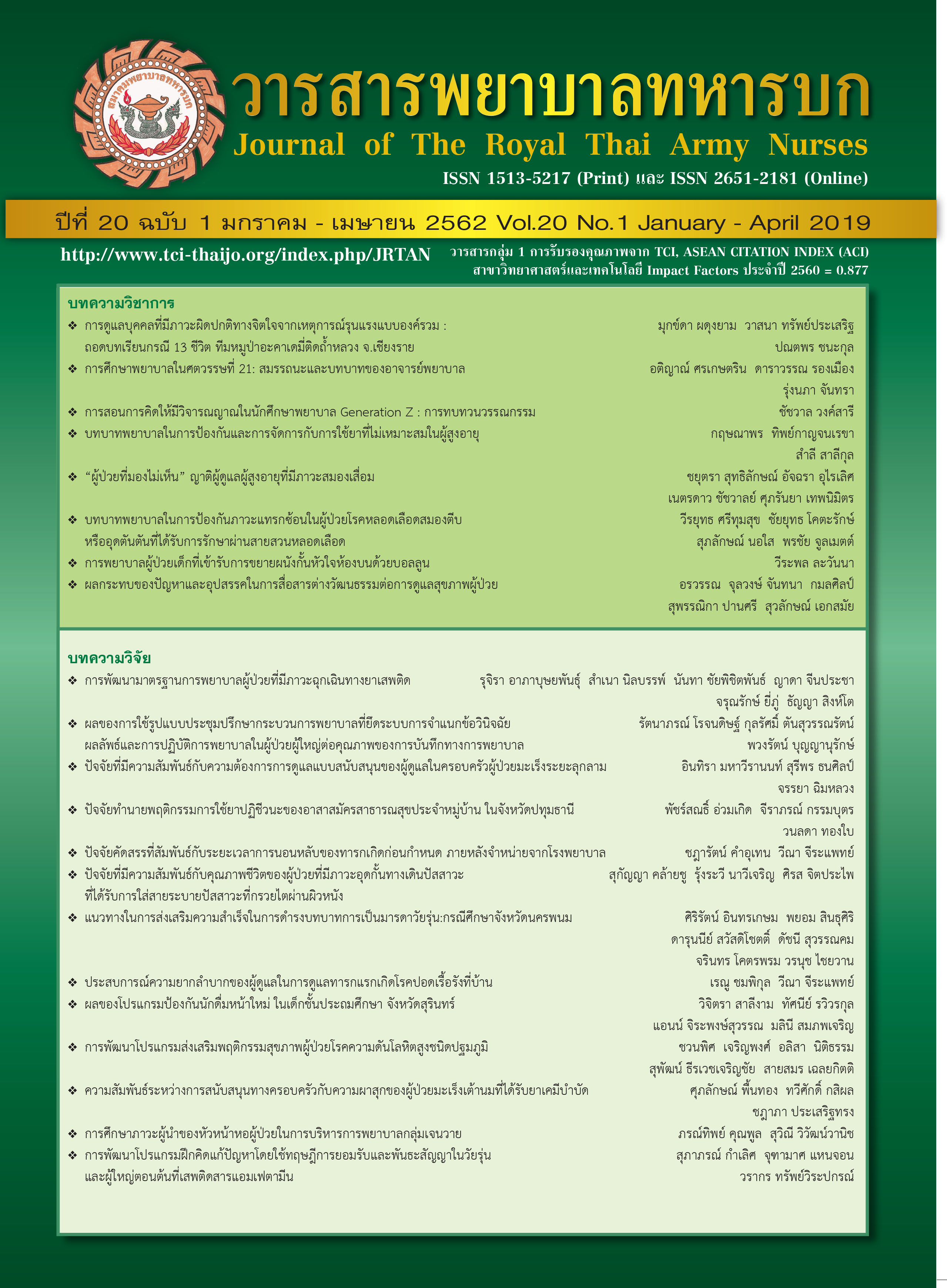The Effects of Self-Efficacy and Family Support Promotion Program on Overweight among Junior High School Students
Keywords:
self-efficacy and family support promotion program, junior high school students, overweightAbstract
The study aimed to investigate the effects of self-efficacy and family support promotion program on overweight among junior high school students by using Quasi-Experimental Research Designs, two group pretest-posttest to examine. The sample were overweight Mathayomsuksa II students. 60 student which are 30 student for control group and 30 students for experimental group. The instruments were the body weight record and the food consumption and physical activity questionnaire. The questionnaire was evaluated for content validity by three experts. CVI was 0.84. Cronbach’s alpha coefficient was 0.75. The statistics utilized for analysis were descriptive statistics; chi-square, and t-test (p < .05) The result showed that after participating in the self-efficacy and family support promotion program, The experimental group had higher average scores of food consumption and physical activity behaviors with the statistical significance at the p-value of .002 and .001 respectively. The scores were more than those of the control group, but they were not statistical significant with the p-value of .655 and .863 respectively. Finally, after participating in the program, the number of overweight students also decreased. Health-promoting personnel could apply this program by working cooperatively with the teacher in order to apply this program in classroom teaching.
Downloads
References
Children’s Nutrition Association of Thailand. Guidelines for the prevention and treatment of childhood obesity. n.p.: 2014 (in Thai)
Sirikulchayanon C. Obesity in school children. 2nd ed. Bangkok: Uranium; 2015. (in thai)
Nursing Council. The nurse brings overweight management. Bangkok: Wattana Printing; 2016. (in thai)
Ruangying J, Jorajit S, Janyam K. Food consumption behavior of adolescents in Songkhla Province: Synthesis of literacy and factors influencing food consumption behavior. Journal of Liberal Arts, Prince of Songkla University, Hat Yai Campus 2016; 8: 258-259. (in Thai)
Patsopoulou A, Tsimtsiou Z, Katsioulis A, Rachiotis G, Malissiova Christos E, & Hadjichristodoulou. Prevalence and risk Factors of overweight and obesity among adolescents and their parents in Central Greece (FETA Project). Int J Environ Res Public Health 2015; 13: 1-10.
Mehrley M, & Leibold N. Overweight and obesity in youth in schools: The role of the school nurse. position statement revised. National Association of School Nurses 2014; 29: 152-153.
Choojan S, Thongbai W, Kummabut J. The effects of Self-Efficacy and family support promotion program on consumption behavior among late school aged children with overweight. Journal of Boromarajonani College of Nursing, Bangkok 2016; 32: 31-43. (in thai)
Bandura. Self-efficacy: The exercise of control. New York: W.H. Freeman and company; 1997.
Plengkratoke S. The relationship between selected factors and the power in practicing of the consumption behaviors for health and nutritional status of youth in Secondary School Ampur Maung, Khon Kaen province. Journal of Nurses’ Association of Thailand, North-Eastern DivIsion 2012; 30: 48-56. (in thai)
House JS. Work stress and social support. Boston MA: Addison-Wesley; 1981
No-in K Overweight and obesity among Thai School-aged children and adolescents. Journal of The Royal Thai Army Nurses 2017; 18: 1-8 (in thai)
Polit DF, Beck CT. Nursing research generating and assessing evidence for nursing practice. 9th ed. Philadelphia: Lippincott Williams & Wilkins; 2012
Kitchanapaibul S, Klunklin S, Klunklin A. The effectiveness of a health education program by applying the Self-efficacy Theory on eating behavior of late primary school students with overweight condition at The Basic Education Expansion in Chiang Kham, Phayao Province. Nursing Journal 2013; 40: 77-87. (in thai)
Downloads
Published
How to Cite
Issue
Section
License
บทความหรือข้อคิดเห็นใดใดที่ปรากฏในวารสารพยาบาลทหารบกเป็นวรรณกรรมของผู้เขียน ซึ่งบรรณาธิการหรือสมาคมพยาบาลทหารบก ไม่จำเป็นต้องเห็นด้วย
บทความที่ได้รับการตีพิมพ์เป็นลิขสิทธิ์ของวารสารพยาบาลทหารบก
The ideas and opinions expressed in the Journal of The Royal Thai Army Nurses are those of the authors and not necessarily those
of the editor or Royal Thai Army Nurses Association.






